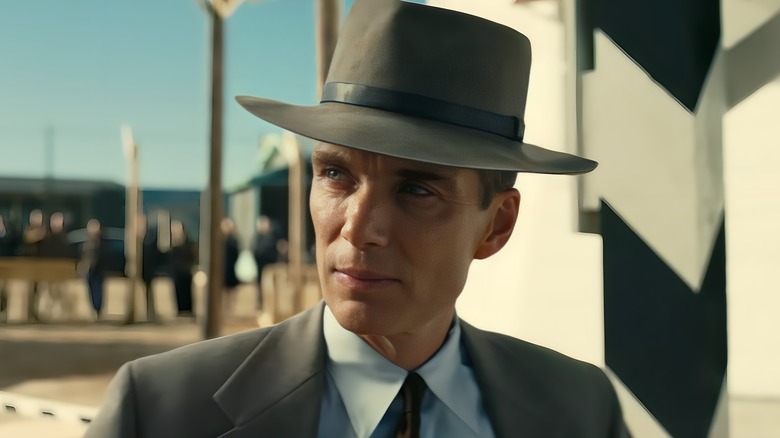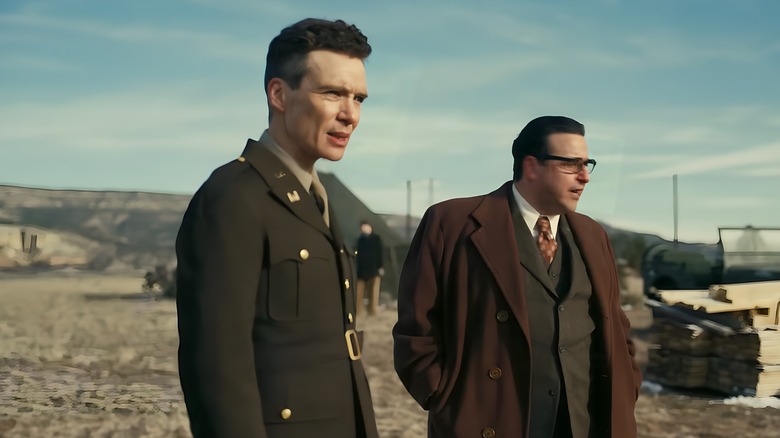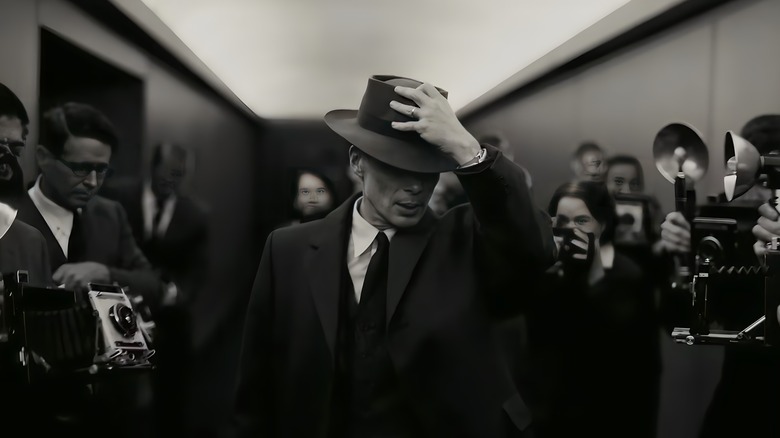Oppenheimer: Is One Dark Joke Actually True?
Contains spoilers for "Oppenheimer"
As a movie about the advent of nuclear warfare and a man grappling with his role in the loss of hundreds upon thousands of lives, it's safe to say "Oppenheimer" isn't exactly a barrel of laughs. To be fair, most Christopher Nolan movies aren't. Still, some moments have a bit of gallows humor to them, including one moment that could have audiences wondering how much truth is to it.
At one point in the film, J. Robert Oppenheimer (Cillian Murphy) sits in a governmental meeting where there's a discussion of which cities in Japan the United States should drop the atomic bombs. Secretary of War Henry Stimson (James Remar) looks over a list of potential targets, but he quickly crosses off Kyoto, initially stating how it's of great cultural importance to Japan, home to thousands of shrines and temples. However, Stimson then makes an off-hand remark that Kyoto is also where he honeymooned.
The flippancy of the statement may elicit laughs from the audience. Dropping the bombs on Japan was largely seen as unnecessary, as the country was likely ready to surrender at that time. But the military decision on where to drop them, deciding the fate of thousands of lives, was altered because one man visited a city with his wife. So what's the truth behind such a remark?
Henry Stimson did have a connection with Kyoto (but it's unclear if he actually honeymooned there)
The United States dropped the first atomic bomb on Hiroshima on August 6, 1945. A second followed in Nagasaki three days later. And if the winds of fate blew in a slightly different direction, it's possible the city of Kyoto would've been forever affiliated with the atomic bomb.
BBC reports how military personnel were very interested in Kyoto as a target. Alex Wellerstein, historian of science at the Stevens Institute of Technology, explained, "Kyoto was seen as an ideal target by the military because it had not been bombed at all, so many of the industries were relocated and some major factories were there." Henry Stimson argued that Kyoto was not a military target, and due to its cultural significance, it should be removed from the list. It wasn't as easy as depicted in "Oppenheimer," as the military continued putting Kyoto on the list of possible targets, forcing Stimson to go directly to President Harry Truman.
Stimson was successful in this endeavor, although it appears he was entirely interested in preserving Japanese culture. It's reported Stimson visited Kyoto periodically in the 1920s when he served as governor of the Philippines. Some historians go so far as to say it was his honeymoon locale, but that hasn't 100% been proven. Despite all this, Stimson was no friend of the Japanese people. He supported the internment of over 100,000 Japanese Americans, saying, "Their racial characteristics are such that we cannot understand or trust even the citizen Japanese." It's perhaps, for this reason, another man is often credited with sparing Kyoto.
It was widely believed Langdon Warner advised against bombing Kyoto
While it's implied Henry Stimson is responsible for sparing Kyoto in "Oppenheimer," history typically looks upon someone different for saving the city. Art historian and archaeologist Langdon Warner was long credited for advising against bombing Kyoto, in addition to Nara and Kamakura, to the point where there are even monuments honoring Warner in Kyoto, Hōryū-ji, and Kamakura. However, the reality of the matter may have been skewed for propaganda.
Japanese historian Morio Yoshida argued in his 1995 book, "Drop the Atomic Bomb on Kyoto," that America pushed Warner as a savior of many Japanese cultural assets as part of post-war propaganda. Professor Wellerstein further elaborated, "We learned enough lessons from the previous wars about defeated enemies hating you, so any spin that would make the Japanese believe that America cared about Japan – whether the people or cultural assets – would be seen as great by the occupation authorities."
There's ample evidence America cared little for Japan, especially considering the war likely could've ended without dropping the bombs. There were even plans to drop a third bomb on Japan (probably Tokyo) on August 19, 1945, but that didn't come to fruition. Another "What if" scenario is that the second bomb was supposed to strike Kokura city on August 9, but those plans had to be scrapped due to bad weather conditions. "Oppenheimer" depicts the great inhumanity people are capable of and how events monumental to the history of mankind can largely come down to chance.


